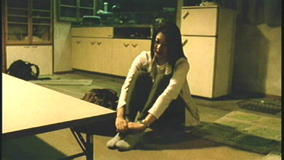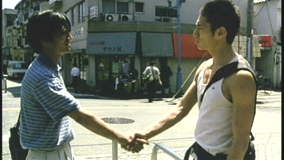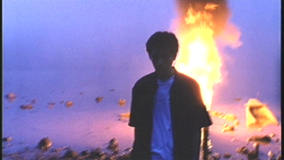Distance (Hirokazu Kore-eda, 2001)
 Hirokazu Kore-edaís third feature, Distance, is a singularly melancholy drama that, like Shinji
Aoyamaís Eureka, is inescapably
informed by the Aum cultís deadly 1995 nerve gas attack in the Tokyo subway. A
radio news report in the opening moments of the movie informs the audience that
the film is set on the third anniversary of a (fictional) poison water attack,
perpetrated by a small cult who called themselves ďThe Ark of TruthĒ. It's
revealed that 128 people died as a result of these attacks, so when Kore-eda
begins to introduce a group of seemingly unconnected characters who meet on the
anniversary of the attacks, itís only natural for the audience to assume that
they are related to the victims. After about half an hour of time spent with
these people, however, comes the surprising revelation that we're watching those
who were related to the perpetrators, and not the victims, of the attack. With
that shift, the movie becomes a reminder of the emotions of the victims most
often forgotten in such tragedies, and a much more complex examination of their
sorrow. Because of more astringent issues of blame and anger, their grief is
almost inconsolable, which makes for a frustrating experience for viewers
expecting emotional closure. Distance is
a movie that stews in its most unknowable questions of responsibility, guilt,
and remorse.
Hirokazu Kore-edaís third feature, Distance, is a singularly melancholy drama that, like Shinji
Aoyamaís Eureka, is inescapably
informed by the Aum cultís deadly 1995 nerve gas attack in the Tokyo subway. A
radio news report in the opening moments of the movie informs the audience that
the film is set on the third anniversary of a (fictional) poison water attack,
perpetrated by a small cult who called themselves ďThe Ark of TruthĒ. It's
revealed that 128 people died as a result of these attacks, so when Kore-eda
begins to introduce a group of seemingly unconnected characters who meet on the
anniversary of the attacks, itís only natural for the audience to assume that
they are related to the victims. After about half an hour of time spent with
these people, however, comes the surprising revelation that we're watching those
who were related to the perpetrators, and not the victims, of the attack. With
that shift, the movie becomes a reminder of the emotions of the victims most
often forgotten in such tragedies, and a much more complex examination of their
sorrow. Because of more astringent issues of blame and anger, their grief is
almost inconsolable, which makes for a frustrating experience for viewers
expecting emotional closure. Distance is
a movie that stews in its most unknowable questions of responsibility, guilt,
and remorse.
 If it worked with the same feel-good
vibe and universal sense of understanding of Kore-eda's After
Life, Distance would betray
itself. Its rambling nature, difficult as it might be to sit through at times
(though only 130 minutes long, it feels closer to three hours), is in retrospect
a definite asset. When the surviving relatives of the executors of the water
poisoning find themselves stranded at the cultís remote, now-defunct
homestead, they are forced to examine their demons more thoughtfully. They meet
up with one of the surviving members of the old cult, and the movie begins a
series of flashbacks that detail the personalities of those who died and their
relationships to the living. Kore-edaís tone remains impartial, opting, for
example, to never make clear the motivations behind the cultís formation or
the decision to poison the water supply. ďAfter everything in this world is
washed away, only the chosen few would remainĒ, says a policeman describing
the cultís rumored motive during an interrogation, but the cult member heís
questioning demurs at the suggestion, saying, with complete conviction, that he
couldnít comprehend the leadersí agenda. Even the scattered flashbacks of
the membersí separations with their families donít add up to a full picture
of the story. Each further revelation about them only further drives home the
actís senselessness. As a result, healing is slow in coming for those left
with unanswered questions. Nothing, even contact with those who can understand
their grief, is anodyne for these people. The movie doggedly maintains an
outsiderís perspective, albeit one seeped through with compassion.
If it worked with the same feel-good
vibe and universal sense of understanding of Kore-eda's After
Life, Distance would betray
itself. Its rambling nature, difficult as it might be to sit through at times
(though only 130 minutes long, it feels closer to three hours), is in retrospect
a definite asset. When the surviving relatives of the executors of the water
poisoning find themselves stranded at the cultís remote, now-defunct
homestead, they are forced to examine their demons more thoughtfully. They meet
up with one of the surviving members of the old cult, and the movie begins a
series of flashbacks that detail the personalities of those who died and their
relationships to the living. Kore-edaís tone remains impartial, opting, for
example, to never make clear the motivations behind the cultís formation or
the decision to poison the water supply. ďAfter everything in this world is
washed away, only the chosen few would remainĒ, says a policeman describing
the cultís rumored motive during an interrogation, but the cult member heís
questioning demurs at the suggestion, saying, with complete conviction, that he
couldnít comprehend the leadersí agenda. Even the scattered flashbacks of
the membersí separations with their families donít add up to a full picture
of the story. Each further revelation about them only further drives home the
actís senselessness. As a result, healing is slow in coming for those left
with unanswered questions. Nothing, even contact with those who can understand
their grief, is anodyne for these people. The movie doggedly maintains an
outsiderís perspective, albeit one seeped through with compassion.
 A few of Distanceís
characters, despite ample screen time, never shift into focus, which is somewhat
surprising considering the depth of characterization that Kore-eda managed with
his entire ensemble in After Life. The
film's prevailing sense of malaise envelops those characters, however, and
thatís a testament to Kore-edaís ability to spin a convincing mood. The
director uses a hand-held camera for the scenes set in the present and a
steadier one for those set in the past, which proves to be an odd, if not
uninspired, stylistic choice. Since most of the action, such as it is in this
talky picture, takes place in the scenes set in the past, the mobility of the
camera visually suggests that it is the after-effects of the tragedy, more than
the familyís initial descent into the cult mentality, or the attack itself,
that has most shaken these people. Kore-eda paces the film in a way that gives
his actors full-berth to work through their charactersí pain, but never asks
any of them to step up to steal a scene. This results in a movie that is as
dramatically flat as it is meditative. There, at least, is a constant awareness
of environment, whether that setting is urban or the opposite, that manages to
provide some excitement when the people arenít quite up to the task. In
summation, it must be said that as respectable an achievement as Distance
might be, itís a tough film to recommend. Because Kore-eda doesnít
sensationalize the juiciest aspects of his story, the feel is often
appropriately inert, but inert nonetheless. When one character mentions that the
cusp between dark and dawn is his favorite part of the day, it's not surprising.
The characters in this movie clearly have weathered many sleepless nights.
A few of Distanceís
characters, despite ample screen time, never shift into focus, which is somewhat
surprising considering the depth of characterization that Kore-eda managed with
his entire ensemble in After Life. The
film's prevailing sense of malaise envelops those characters, however, and
thatís a testament to Kore-edaís ability to spin a convincing mood. The
director uses a hand-held camera for the scenes set in the present and a
steadier one for those set in the past, which proves to be an odd, if not
uninspired, stylistic choice. Since most of the action, such as it is in this
talky picture, takes place in the scenes set in the past, the mobility of the
camera visually suggests that it is the after-effects of the tragedy, more than
the familyís initial descent into the cult mentality, or the attack itself,
that has most shaken these people. Kore-eda paces the film in a way that gives
his actors full-berth to work through their charactersí pain, but never asks
any of them to step up to steal a scene. This results in a movie that is as
dramatically flat as it is meditative. There, at least, is a constant awareness
of environment, whether that setting is urban or the opposite, that manages to
provide some excitement when the people arenít quite up to the task. In
summation, it must be said that as respectable an achievement as Distance
might be, itís a tough film to recommend. Because Kore-eda doesnít
sensationalize the juiciest aspects of his story, the feel is often
appropriately inert, but inert nonetheless. When one character mentions that the
cusp between dark and dawn is his favorite part of the day, it's not surprising.
The characters in this movie clearly have weathered many sleepless nights.
53
Jeremy Heilman
05-24-04